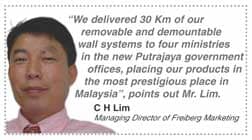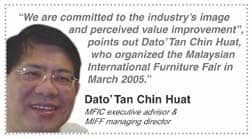This sponsored supplement was produced by Focus Reports that takes sole responsibility for its content. Text and research: Nicolas André. Advertising and project coordination: Crystelle Coury. For more information please contact info@focusreports.net
The Malaysian furniture industry is changing rapidly while showing impressive growth. Strongly encouraged by the Kuala Lumpur Government through its second IMP (Industrial Master Plan), these changes aim at transforming their second largest export sector into a high-end, national pacesetter.

Feeling increased competition from its Asian neighbors, and originally specializing in the supply of low cost products, the Malaysian furniture business is now considered a sunrise industry. Furniture exports have grown at an average of 10 per cent every year this past decade. The country is today the 15th most important exporter of furniture worldwide with exports reaching RM6.38 billion last year from RM5.78 billion in 2003. This year, the Government expects furniture exports to jump by another 10 per cent to breach the RM7billion mark.
“Furniture is important today and will remain important in the future,” asserts the Minister of Plantation Industries and Commodities, Datuk Peter Chin Fah Kui. “This industry provides employment and expertise. As you know, we traditionally have very good craftsmen here in Malaysia, so we plan to capitalize on this competitive edge.” The Government is indeed wooing foreign direct investment (FDI) from global furniture players to make Malaysia their base to export to the Asean (Association of South-East Asian Nations) market.
“When foreign furniture makers come in, they will eventually transfer technology to our local manufacturers and introduce different marketing ideas that can sell furniture at premium prices”, points out the Minister.
In spite of good growth and a high level of political awareness, the national furniture industry still faces challenges. Labor is one of these. Malaysia depends on foreign workers coming from Indonesia, Bangladesh or Vietnam. “Our fear is that these countries will also embark at one stage on their own development and will need their workers back”, explains the Minister. National authorities have, therefore, decided to emphasize automated computer-manufacturing processes in order to become more self-sufficient. Besides these measures, Malaysian companies cooperate with manufacturers in low wage countries such as Indonesia and Vietnam to create production efficiencies. This strategy allows Malaysian manufacturers to integrate these countries’ advantages into their manufacturing processes.

Still, the new international marketplace requires more from Malaysian furniture manufacturers than just efficiency and low costs. They’ve aggressively pursued other competitive advantages to enhance their marketing positions.
“Malaysia’s former cheap Labor force’s competitive advantage is now tackled by countries such as China or Indonesia, so the industry must diversify and reposition itself using its strengths: good manufacturing skills, designs’ integration, creativity and innovation” asserts Mr. Dato’ Tan Chin Huat, Chairman and Managing Director of the Malaysian International Furniture Fair (MIFF), the most prominent of the three furniture fairs hosted every year by Malaysia.
The 2005 edition of the MIFF was quite a success considering that there were three fairs taking place during the first week of March, as well as a global drop-off in exhibition attendance. Nevertheless, MIFF experienced in 2005 an increase of 4.6% of international visitors and buyers.
“We are proud to say that the sales generated yearly at MIFF accounts for 40% or over RM2 billion worth of furniture exports”, boasts Mr. Dato’ Tan whose aspiration is to make Malaysia the international furniture hub in Asia. “Given Malaysia’s location in the heart of Asia, it can act as a gateway for entry in the markets of China, Japan, Korea and India”.
The significant number of international exhibitors (32%) has boosted the fair’s reputation overseas. With 14 countries represented - exhibitors come from such diverse countries as Australia and the European Union besides the more usual neighboring countries, proving that the appeal of the Malaysian International Furniture Fair is very strong.
Regarding the organizational side, Mr. Dato’ Tan considers, “that MIFF played its role effectively by identifying and targeting niche buyers”. In his view, Malaysian standards for furniture have improved considerably over the years. He states that more can still be done in the areas of international marketing and branding. “Our mindset should now be focused on coming out with unique product offerings, by capitalizing on originality and innovativeness to the international market. Perceived value should be increased at every single step of the design and manufacturing process to remain competitive”, concludes Mr. Dato’ Tan.

To maintain their competitive edge, the Malaysian furniture industry is benchmarking itself against international standards in design and creativity.
“Design is the most important factor that is guiding the process of upgrading into medium and higher-end market segments. We will be encouraging through the Malaysian Furniture Promotion Council MFPC the creation of a design institute in Kuala Lumpur”, states Datuk Peter Chin.
The industry constantly monitors international competitions for young designers. In addition, other design initiatives are being taken. Limkokwing University developed an “Industry within University” program that creates working relationships between furniture industry professionals and design students. These meetings will take place within the Malaysia Design Innovation Centre, as an integral part of the University. It will serve the students as a showcase for creativity and innovation and will provide them with a suitable environment to create and manage products and services.
“Being in the low-end market segment, waiting for customers to come, there was no need for the Malaysian furniture industry to establish its own design culture,” remembers Datuk Peter Chin. The idea is to spread the word within the manufacturing community that it is no longer a good business practice to always wait for importers to specify designs.
The Malaysian Design Council (MDC) acts as a government think-tank to promote the effective use of design in business. According to Mr. Jamaluddin Tukimin, Manager of the MDC, Malaysian manufacturers lack consistency in their designs. “Our problem is that we prefer to diversify on completely different designs rather than capitalizing on existing ones. We should instead develop home furnishings collections that symbolize the company’s brand”, says Mr. Tukimin.

The MDC also stresses the importance of associating an emotion with the products. “We aim at creating pieces of art that will arouse the customer’s inner self”, he explains.
Mr. Tukimin is aware that the cost of a famous designer may be prohibitive for a furniture manufacturer. Using grant funds made available by the Malaysian Furniture Promotion Council (MFPC), MDC is working to assist young local designers in setting up their own consulting companies. Malaysian manufacturers will soon be able to benefit from this initiative.
“Design is the biggest aspect of our industry’s upgrading process into medium and higher segments,” concludes the Minister.
Malaysian “Made In”
“Branding is a long-term process in which all elements have to be considered, and where consistency is the key. There must be a strong relationship between the uniqueness of the product, its design, quality, and price. This is how a brand can become an industry reference point”.
According to Mr. Cha, President of the Malaysia Furniture Entrepreneur Association (MFEA), Malaysian Furniture needs to establish its brand in order to conquer new markets. This Non Governmental Organization wants to increase its members’ awareness of the important issues of design and creativity, as well as quality and branding through seminars and workshops. MFEA is the organizer of the Export Furniture Exhibition (EFE) that took place in the first week of March 2005. In the future, Mr. Cha plans to invite established foreign companies and designers from Italy and Germany to participate at the fair, in order to enhance the local industry. Once the brand is recognized locally they can go abroad and participate in foreign fairs and events.

“In order to be successful, we shall benchmark Italy, the worldwide leader in furniture design, and enhance our own designs as to create a recognized Malaysian “Made In”, puts Mr. Cha. “We urge our members to partner with Italian companies to benefit from their know- how and participate in technology transfers”.
Skills and tradition: the focus on quality
As previously noted, price in itself is no longer a competitive advantage, so furniture manufacturers have been encouraged to create their own niche markets and incorporate a design culture within their production capacities.
Some companies have, therefore, decided to go back to their cultural roots and develop indigenous-style products. South East Asia has unique assets that include a strong carving culture, unique artists and rare wood species. Some companies are capitalizing on this unique know-how and see an opportunity to offer furniture based on traditional designs.
Hand crafted products can be presented as pieces of art and a number of companies have positioned themselves in the high end of the market.
Rainforest Furniture
Rainforest is such a company. It manufactures furniture handmade by master carpenters. “We promote a tradition which can be traced back as far as 2000 years ago, allowing us to propose to our customers fine original furniture”, explains Mr. Ong, the founder of Rainforest. The company crafts heirloom quality furniture whose value will increase with time. All Rainforest furniture is made of carefully selected and logged teak wood. “By 2006 we will start to manufacture limited collections of our products as to increase perceived value by a rarity factor”, adds Mr. Ong.
Rainforest’s strategy has been applied on a global level by Mr. Bin Othman, Managing Director of Dewaland Projati. His aim is to become the number one indoor teak furniture manufacturer, worldwide, within five years. This core idea arose after a trip to Indonesia where Mr. Bin Othman discovered important reserves of high quality teak, and “more than 70,000 carpenters, all skilled handicraftsmen, creating pieces of furniture”. Only a lack of marketing skills prevented these beautiful products from reaching important markets. Mr. Bin Othman resigned from his position as a Civil Servant for the Foreign Ministry of Malaysia and set up Dewaland Projati in 1995. “While most of our competitors try to integrate European or American styles within their designs, because they think it is what customers want, we prefer to concentrate on our own genuine culture and styles and build on them. Being part of such a diverse culture is a pride and a chance. That is why we should take advantage of it”, explains Mr. Bin Othman.
Years of experience and success allow Mr. Bin Othman to adapt manufacturing processes to his customers’ needs. “Depending on the country, we make sure the humidity rates of our products allow for the best durability”, he says.
In addition to raw material control and treatment, all craftsmen have to prove their skills through trial orders before becoming an integral part of Dewaland Projati’s network. “Dewaland Projati’s main strength is its capacity to identify the key workers in Indonesia able to manufacture each type of product”, explains Mr. Bin Othman. Thanks to the significant number of carpenters, their skills, and the company’s specific knowledge of its customers, almost any product can be manufactured. It is no wonder the company exports to more than twenty different countries.
“We have to prove our quality, as Malaysia is still considered a cheap manufacturing country. But we produce unique pieces of art and never compromise on quality”, insists Mr. Bin Othman, whose company is ISO 9001 certified.
Shinawood Manufacturing
When Mr. Yeoh Thart Seng founded Shinawood Manufacturing in 1996, he wanted to differentiate his company from high volume manufacturers, thus avoiding the low-end competition. After living several years in Japan, he came up with the idea of specializing in the production of Japanese style furniture. The objective was to provide high-end markets and top quality products to Malaysia’s second largest export market.
He decided to focus on innovation rather than specialization. The company became an Original Design Manufacturer (ODM) in 1998.
“In order to promote our products and guarantee a good branding, Shinawood will keep on focusing on unique offerings that are pieces of art and concept furniture,” points out Mr. Yeoh.
In 1999 Shinawood Manufacturing started to produce traditional dining Kotatsu sets - now Shinawood’s flagship products - after Mr. Yeoh discovered their importance in Japanese society. These high-end sets are produced at competitive prices.
Mr. Yeoh sends his products to Europe and other markets where Japanese minimalist style is very much appreciated. In 2004, Shinawood reached a notable 15 million RM turnover, and expects to reach 20 million RM in 2005 thanks to an increase in production capacity through a Joint Venture with a Vietnamese manufacturer. The Malaysian company will keep all assembling and finishing under its own control to make sure it has the final word on quality.
Shinawood is also targeting the US market. Because American customers have not yet embraced “Japanese style furniture”, The R&D team is currently adapting their design to American’s tastes and trends. This new product range will be launched in 2006.
Niche markets: Specializing In High-Value Segments
Another way to face increasing competition is to develop new niche markets based on sophisticated designs and technologies. A number of Malaysian companies are, therefore, creating high-value added products that have excellent branding potential.
Dalcy
After acquiring experience in one of the main Malaysian office chair manufacturers, Mr. Michael Chung decided to start his own company, Dalcy, that specializes in the high-end segment leather motion sofas and reclining chairs. “People tend to look for better homes and more comfort as their purchasing power increases. They are then ready to spend more, to enjoy a life that reflects their new status”, explains Mr. Chung.
His previous experience gave him the expertise necessary to integrate state of the art mechanisms with beautiful upholstery treatments. Although moving parts are outsourced, Dalcy incorporates its own improvements to enhance chair function and durability. The leather is sourced from the best Italian and Brazilian tanners. All leather and foam cuttings are homemade, and special attention is put on assembling and finishing. “The most important aspect of quality is to integrate an overall policy on what to use in our products. We source for the best components and are ready to pay more to offer the best products in terms of quality, design and durability to our customers”, emphasizes Mr. Chung. This strategy has allowed Dalcy to grow over the years with an increasingly loyal customer base. So far this year, Dalcy has increased shipments of 40’ containers and has boosted production capacity by 20%.
In order to get the best design possible, Mr. Chung implemented Computer Assisted Design software to save time and enhance the materials’ cutting process. Dalcy follows important design trends and always focuses on creating value and enhancing product durability.
Mr. Chung participates in foreign fairs where buyers are looking for upper end products. He brands his products under the Fabio Mazzero name. This strategy has been a good way for Dalcy to work with niche market retailers willing to emphasize quality, design, innovation and product durability.
Tai Lee Industries
From an iron and steel tubes manufacturer to the furniture industry, Tai Lee Industries, headed by Mr. Ter, started producing reclining chairs in the 1980’s. In the 1990’s, he decided to use state-of-the-art 999 series reclining mechanisms including “zero-wall systems”, providing customers with more comfort, durability and a lighter product. He also introduced an upholstery line to ensure quality and leather cutting optimization techniques.
Tai Lee Industries’ main challenge is to respond to its customers’ requirements. “In order to ensure continuous supply to our customers, we increased our production capacity in 2003 by 35%, and we will follow the same pace in 2005”, explains Mr. Ter. These investments are meant to increase the satisfaction of the customer and competitiveness.
Further expansion will surely be in China. “We want to increase our presence in the USA and Canada, so shipping from China will reduce delivery time, allowing for more shipments and provoke a decrease in our customers’ stock management. We will also be able to enhance our price competitiveness”, explains Tai Lee’s Managing Director.
Mr. Ter is particularly aware of his customers’ needs. “We provide our customers with stock management and consider ourselves as a part of their logistical chain. This is why we exclusively work with medium sized retailers for whom we can provide support”, he says. Besides logistical support, Tai Lee Industries adapts to its customers’ requirements in terms of prices. 90% of Tai Lee Industries’ products are upholstered with high quality leather, the rest with fabric. “We are answering the concerns of some of our customer who like our designs but want to be able to offer a different range of prices to their clients”, explains Mr. Ter.
His marketing strategy is also clear. “We look for medium sized retailers, with five to fifty stores to maximize geographic positioning”.
“By 2006, we should reach a turnover of USD 25 to 30 million, and we aim at becoming by 2010 one of the top ten South East Asia manufacturers of reclining and motion products”, he concludes.
OEM
Customer-Oriented Strategies
In niche markets, customer service is, besides quality, a decisive factor and the ultimate competitive advantage. Johor Baru, located in South East Malaysia, has become the main centre for furniture manufacturing. Supported by a large number of smaller suppliers, some companies located there provide high volume markets with inexpensive products. Most are original equipment manufacturers.
Sern Kou
“Our marketing strategy is aimed at maintaining a large customer base, mainly small and medium size, to reduce our dependence on one unique large customer” explains Mr. Quek Wee Seng, Executive Director of Sern Kou, one of these dynamic Johor Baru companies.
The company started as a sofa manufacturer and, after a few years, switched to wooden-based dining sets due to raw material availability. Sern Kou manufactures dining sets, occasional furniture, living room, buffets and hutches, as well as bedroom sets, 80% are sold OEM, the rest marketed under the SK brand. This wide range of products allows the company to match any of its potential customers’ needs. They’ve become a one-stop-shop offering all kinds of products shipped in mixed containers.
To better manage its wide range of products, Sern Kou established an original production system that permits multiple lines to be produced simultaneously. Vertical integration in rubber wood processing and direct relationships with plantation owners allow Sern Kou to control its raw material quality. The company has, therefore, moved into medium to high segment furniture production.
Sern Kou is constantly growing and keeps excellent profit margins. In 2003 it maintained a healthy 10% net profit margin. The company takes care to ensure that its retail customers do not become direct competitors by granting them regional exclusivity. Current export regions include North and South America, Australia, New Zealand, the UK, the Middle East, Korea, Philippines and Singapore.
“Sern Kou is part of these Malaysian companies involved in changing the perception international buyers have of Malaysian furniture products”, asserts Mr Quek.
Even though Sern Kou’s Executive Director would like to increase the share of products sold under its Sern Kou brand name, “working as an OEM allows us to increase our knowledge of the markets’ requirements and better gauge potential customers’ needs for product quality”, he points out.
Ly Furniture
LY Furniture’s strategy is also customer-oriented. This company chose to rely less on overseas expansion than on local outsourcing. The philosophy of this OEM, also based in Johor Bahu, consists of managing raw material sourcing, and assembling and finishing its products in order to ensure quality at both ends of the manufacturing process.
“We’ve developed close relationships with our suppliers,” asserts Mr. Tan Kwee Chai, Managing Director. “As their numbers have increased over the years, we’ve participated in their processes’ definition to enhance quality levels and manufacturing efficiency. We need them as much as they need us, and our success depends on their ability to create good products.”
The company controls its finishing operations to ensure product uniformity, which would be impossible if it used multiple suppliers.
LY Furniture owns eleven factories with a total production capacity of 300 to 400 containers per month, which can be increased by 50% by adding shifts. Like other OEMs, LY Furniture has focused on supplementing its products by offering original designs to its customers. The company is currently developing a hospitality line based on customer demands.
Mr. Tan is also investigating opportunities to establish a joint venture with a US manufacturer having established distribution and a desire to outsource its designs.
International Presence Looking Towards America
Shinawood’s interest in supplying the American market is shared by the majority of Malaysian furniture companies. In the turmoil of globalization, the US remains the Malaysian furniture market’s primary and most long-term reliable partner.
This relationship is encouraged by the Malaysian Authorities, aware of the significance of such a wide and dynamic market.
“We will work and develop according to the evolution of American consumers’ contemporary trends and tastes”, confirms the Minister of Plantation Industries and Commodities, Datuk Peter Chin. “We intend to further take into account what is in the interest of US buyers and what is most suitable for them. I hope Malaysian furniture will be widely accepted there and recognized for its consistency and quality.”
Far East Foam Industries
Mr. Chris Loo, Managing Director of Far East Foam Industries (FEFI) is committed to the US market, now generating 28% of its revenues, and wishes to secure its presence in the USA through OEM products.
After graduating from the University of Fresno with a degree in Business Administration, he went to work for his father’s company. In 1992, Mr. Loo saw the opportunity to grow in the bedding industry and invested in state-of-the-art continuous foaming machines that gave him greater autonomy in terms of sourcing, and enhanced his companies’ price competitiveness.
In 1999, he signed a US licensing agreement with Lady Americana, a relatively young company specializing in selling top quality mattresses: FEFI started to manufacture, distribute and market Lady Americana, mattresses in the Malaysian and Singaporean markets. Lady Americana has since become the leading mattress brand in the region.
“It is difficult for Malaysian companies to promote their own brand because of the image of local products,” explains Mr. Loo. “Working with Lady Americana taught us how to market a high quality brand with a good overall image, and, since we did it, as if it was our own brand, we transferred this know-how to the marketing of our own products”.
In 2004, FEFI added an in-house design department to create additional products. “We are looking to develop technology as to enhance comfort, instead of focusing on price and promotion. We want to win market share, by responding to consumer’s needs,” explains Mr. Loo. The long-term partnership with Lady Americana allows FEFI’s designers to learn new techniques, and the company is now launching its Intelli Sleep mattresses based on memory foam for better support and sleeping comfort.
As to be consistent with its overall strategy, Mr. Loo focuses on quality through a dedicated management system that continuously improves internal processes. “FEFI’s philosophy is to have our workers manufacture products they would buy”.
In order to pursue its growth, FEFI is expanding its operations abroad, through a 100% owned plant to be settled in Vietnam. This 1.5 million US dollar investment will allow FEFI to use the excellent Vietnamese labor pool to double its production capacity while tackling the fast growing Vietnamese market, that looks very much like the Malaysian market did 30 years ago. “We assume Vietnam’s furniture and especially their mattress market, will grow even more than Malaysia’s”, predicts Mr. Loo. This plant will start production in September 2005.
“As Malaysian companies complain about neighboring countries’ low cost competition,” Mr. Loo states continues, “We have extensive access to natural resources to sustain our growth, and Malaysia is leading the way in the region in terms of marketing and sales. Being a multi-cultural country with a strong English based culture, communication with foreigners is easy and we are aware of their needs”.
Freiberg Marketing
Long reluctant to tackle big volume markets like the USA, Freiberg Marketing, the Malaysian subsidiary of the well-known Australian-based office furniture specialist, is also looking towards the American market. “We have now reached capacity to supply these markets without sacrificing on profitability, explains Mr. C.H. Lim, Managing Director. We can therefore respond to quality requirements as we’ve done in the Australian market”. In that regard, Mr. Lim forecasts the importance of future consolidation to move towards a first-world industry type. “Size and capabilities become the competitive edge that give credibility to a furniture manufacturer,” he explains.
Mainly selling its office furniture systems to international companies, Freiberg Marketing has positioned its products to appeal to a more developed segment. “We have a very aggressive policy in terms of positioning, and we want to be perceived as a high-end segment furniture manufacturer. This is why we do not compromise on quality”, emphasizes Mr. Lim, adding: “Freiberg Malaysia is not competing on prices. Products are valued in terms of quality and original design, and positioning on the high-end segment means higher prices, reducing volume but creating a strong image. The only condition is the sustainability of the quality and customers’ satisfaction”. The company also strives to participate in landmark projects in order to improve its image and value. “We delivered 30 Km of our removable and demountable system wall to four ministries in the new Putrajaya government offices, placing our products in the most prestigious place in Malaysia”, points out Mr. Lim.
Under the influence of Freiberg Australia, the Malaysian subsidiary adopted the Australian Furniture Research and Development Institute’s (AFRDI) Standards as its benchmark and continuously enhances its manufacturing processes and quality by integrating state-of-the-art machinery in its facilities. Ensuring constant quality allows Freiberg Malaysia to build strong relationships with its customers, and over 60% of them are repeat purchasers. “Only by creating strong relationships and responding to customer feedback can we relate our products to their value, and show we are a strong player,” believes Mr. Lim.
Teknion Furniture Systems
Malaysia had also much to gain when, in 1995, a Canadian company, Teknion Furniture Systems, initiated its operation with an assembly plant in Tangkak Johor, a Southern state, as their Asia Pacific regional hub. In 1999, Teknion acquired its current manufacturing facility in Klang, an hour away from Kuala Lumpur city.
Believing that people are the greatest asset of any organization, Teknion has established programs to attract and retain excellent employees. In addition, it has been the only company in the Malaysian office furniture industry to become heavily involved in automation and is invested in continuous research and development.
Through vigorous employee training and a transparent working culture, Teknion Furniture Systems has been able to position itself as a major player in the sector. Faithful to his motto, “Design does matter”, the company has also developed parallel activities such as co-hosting the CAADRIA 2002 design conference. They’ve also organized design workshops known as Designer’s Saturday with Asia Design Forum, which drew hundreds of designers and architects from all over South East Asia for the purpose of exchanging views and ideas.